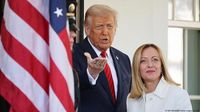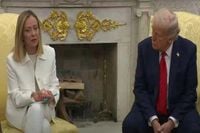In a significant meeting on April 17, 2025, Italian Prime Minister Giorgia Meloni met with US President Donald Trump at the White House, where they discussed the potential for a trade deal between the United States and the European Union (EU). Trump expressed his optimism, stating he was "100 percent" confident that an agreement would be reached, emphasizing that both sides were eager to negotiate.
During their discussions, Trump highlighted the importance of transatlantic trade, noting that the interconnectedness of their economies is crucial not just for Italy but for the entire European bloc. He stated, "There’ll be a trade deal. 100 percent. Why you think there won’t be? Of course, there’ll be a trade deal," reinforcing his belief in a fair resolution to ongoing trade tensions.
Meloni, who leads a far-right government in Italy and has positioned herself as a mediator between the US and Europe, acknowledged the challenges posed by Trump's tariffs. The EU currently faces 25% import tariffs on steel, aluminum, and cars, alongside broader tariffs on nearly all other goods. Despite these hurdles, Meloni expressed confidence in finding common ground, stating, "We’re governing at probably the most difficult time since the post-war period." She added, "We’ll address the issue of tariffs with determination and pragmatism, without alarmism."
In a related note, the White House has threatened to stop Harvard University from enrolling international students if the institution does not comply with government demands for political supervision. This move comes after Trump criticized the university for rejecting requests to overhaul its academic programs, calling it a "joke" and suggesting it should lose its federal funding.
As tensions rise between the Trump administration and educational institutions, the Internal Revenue Service is reportedly planning to rescind Harvard's tax-exempt status. This decision follows Trump's announcement to freeze over $2.2 billion in federal grants and $60 million in contracts with the university after it defied government oversight demands.
Meanwhile, the Supreme Court announced it will hear a case regarding Trump's executive order aimed at ending birthright citizenship. This order has been stalled by district courts, with the Supreme Court set to review the issue on May 15, 2025. Trump's administration argues that children of non-citizens are not entitled to citizenship as they are not "subject to US jurisdiction," a phrase used in the 14th Amendment.
In the realm of international relations, the Trump administration has also faced scrutiny over its handling of deportations. Maryland Senator Chris Van Hollen was denied access to Kilmar Abrego Garcia, a man mistakenly deported to El Salvador. Van Hollen criticized the El Salvadoran government for not allowing him to visit Abrego Garcia, who fled gang violence and had received a protective order to remain in the US.
Amid these developments, California Governor Gavin Newsom has filed a lawsuit against the Trump administration, arguing that the president's tariff regime has significantly impacted the state's economy. California ports account for approximately 40% of US imports, and retaliatory tariffs could jeopardize the state's agricultural exports, which totaled $23.6 billion in 2022.
On the international front, China has replaced its trade representative amidst stalled negotiations with the US over escalating tariffs. Trump's administration has notably targeted China, raising tariffs to 145%, while China has responded with its own increased levies on US imports.
In a controversial move, the US State Department announced the closure of the Counter Foreign Information Manipulation and Interference (R/FIMI) office, which aimed to combat disinformation globally. Secretary of State Marco Rubio justified the closure, alleging the office was censoring conservative speech and costing taxpayers over $50 million annually.
As the political landscape continues to shift, Meloni's visit marks a pivotal moment in US-EU relations, with both leaders expressing a desire to strengthen ties. Meloni has extended an invitation to Trump to visit Italy, further solidifying their alliance.
In summary, as the Trump administration navigates complex domestic and international challenges, the meeting with Meloni highlights the ongoing efforts to resolve trade disputes and strengthen economic partnerships. With a focus on negotiations, both leaders appear committed to finding solutions that benefit their respective countries.





